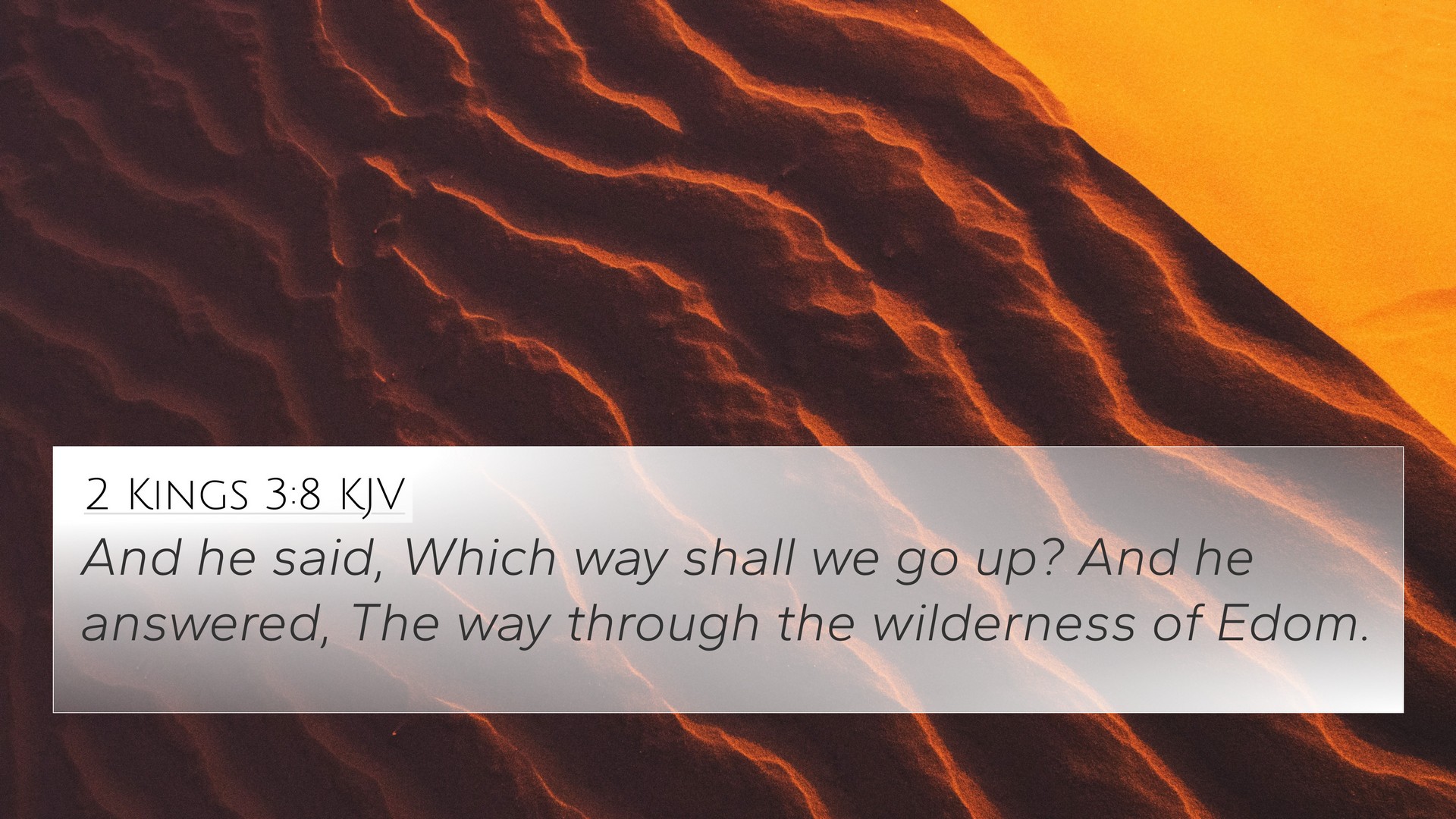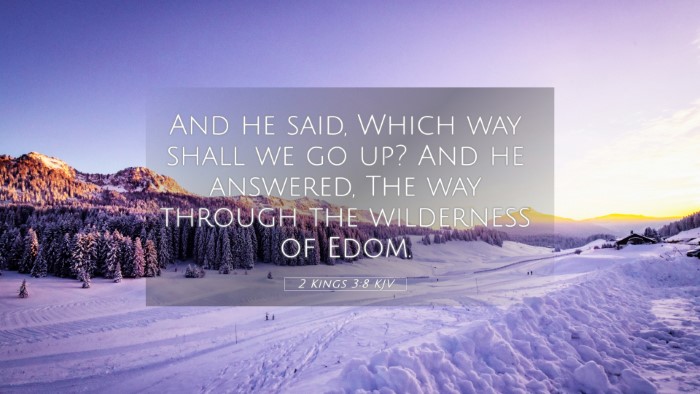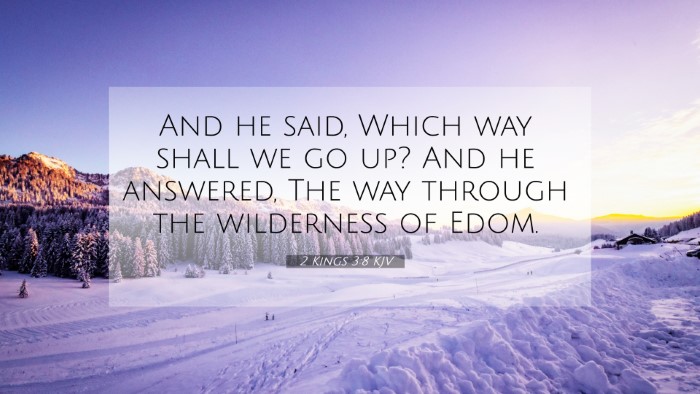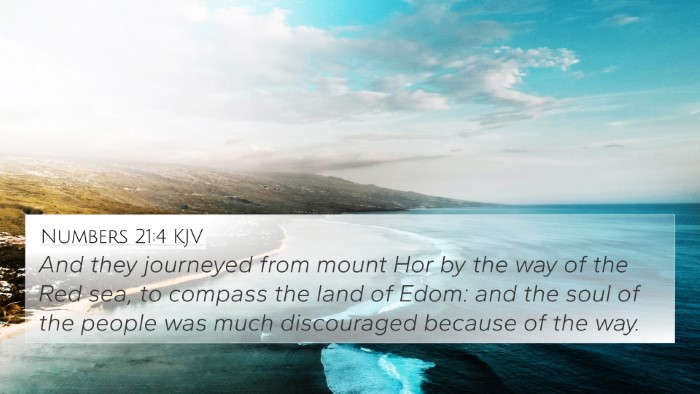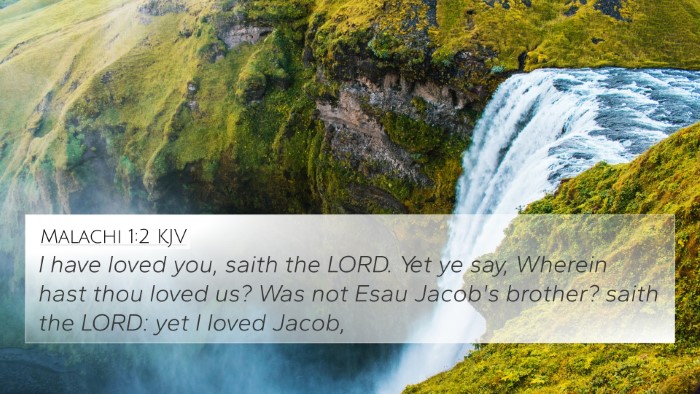Understanding 2 Kings 3:8
Bible Verse: 2 Kings 3:8 - "And he said, Which way shall we go up? And he answered, The way through the wilderness of Edom."
Summary of Interpretation
This verse encapsulates a moment of decision and inquiry within the context of Israel’s military endeavors. The question posed by the king of Israel reveals a need for direction, while the response emphasizes the wilderness route, which symbolizes both challenge and divine guidance.
Key Themes:
- The importance of seeking direction from God.
- The symbolism of wilderness in the journey of faith.
- Leadership and decision-making in times of crisis.
- God’s providence in seemingly desolate circumstances.
Detailed Commentary Insights
Matthew Henry's Commentary
Matthew Henry emphasizes that the inquiry for direction shows the importance of relying on divine guidance as kings are accountable for their decisions. The wilderness route through Edom serves to illustrate the need for commitment and reliance on God's provision, much like how Israel faced many trials on their way to the Promised Land.
Albert Barnes' Commentary
Albert Barnes points out that the interaction unfolds in a pivotal moment of decision, stressing Israel’s dependence on seeking God’s will. The choice of the wilderness route is considered a necessary path that often leads to divine revelations and blessings, albeit through hard times and trials.
Adam Clarke's Commentary
Adam Clarke highlights that the route represents both a geographical and spiritual journey. He notes that "wilderness" is often associated with both temptation and testing—the Israelites' experience in the wilderness is echoed here. It stresses how leaders should ask for divine direction instead of relying solely on worldly strategies.
Cross-References
To better grasp the implications of 2 Kings 3:8, consider these relevant cross-references:
- Exodus 15:22: Journey through the wilderness.
- Deuteronomy 8:2: God's testing in the wilderness.
- Psalm 78:52: Leading His people like a flock through the wilderness.
- Isaiah 43:19: God makes a way in the wilderness.
- Matthew 4:1: Jesus led into the wilderness by the Spirit.
- Luke 4:1-2: The temptation of Jesus in the wilderness.
- Hebrews 3:17–19: Warning against disbelief in the wilderness.
- Revelation 12:6: The woman's flight into the wilderness for protection.
- 2 Samuel 5:24: Seeking God’s guidance in battle.
- James 1:5: Asking God for wisdom.
Thematic Connections
The themes present in 2 Kings 3:8 echo throughout Scripture. The exploration of faith and reliance on God in decision-making resonates from the Old Testament to the New. Notably, the idea of the wilderness as a space for testing and spiritual growth is a potent motif in the biblical narrative.
Inter-Biblical Dialogue
When analyzing 2 Kings 3:8, it becomes evident that the dialogue between verses forms a rich tapestry that connects various narratives and teachings in the Bible. This enhances our understanding of related principles, such as guidance in adversity, the importance of leadership, and faith's endurance through trials.
Tools for Bible Cross-Referencing
Utilizing tools such as a bible concordance or a bible cross-reference guide can help enhance your study of scriptures related to 2 Kings 3:8. Engaging with these resources will enable a deeper understanding of how themes echo throughout biblical texts.
Cross-referencing Bible Study Methods
For effective cross-referencing, consider using methods that involve thematic and textual similarities. Look for concepts and narratives that interrelate, providing a broader understanding of biblical principles and the continuous dialogue within the scriptures.
Conclusion
2 Kings 3:8 serves as a pivotal reminder of the necessity of seeking divine guidance in leadership and life's journey. The wilderness path symbolizes not just physical terrain but also the spiritual challenges one faces. Through careful study and cross-referencing with related Bible verses, one can draw profound insights on reliance, testing, and guidance that result in growth and understanding in faith.
